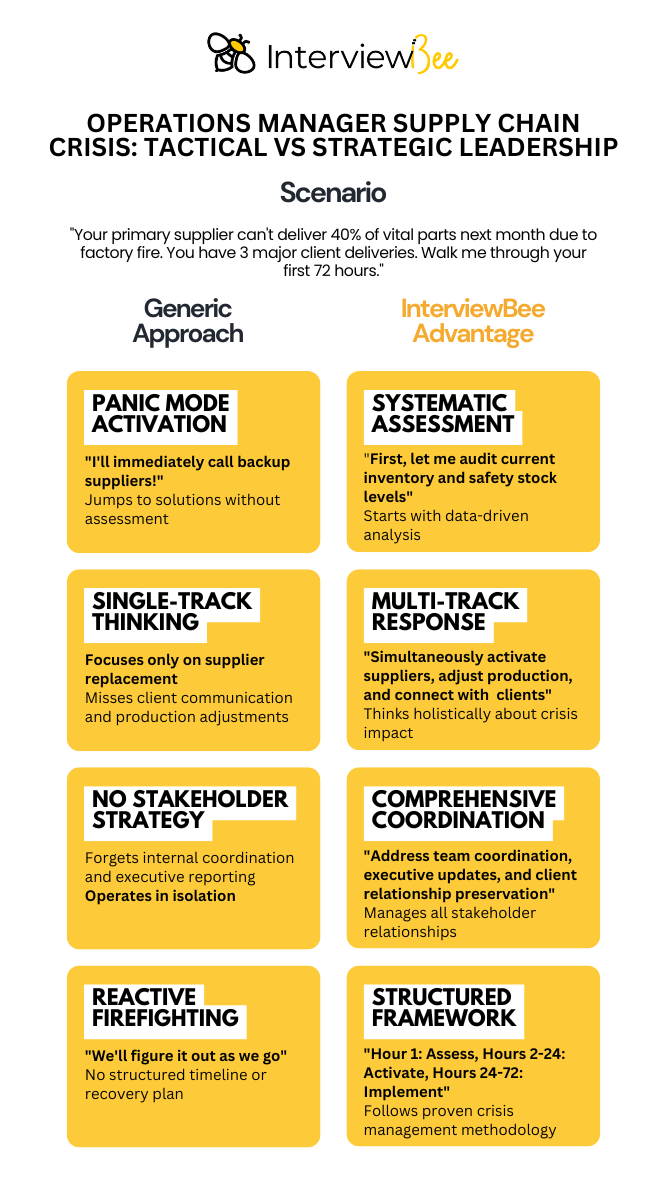
Operations Managers: The Supply Chain Crisis Question That Derails 69% of Experienced Leaders in 2025
- Author: Anindita Ghosh
- Published On: July 13, 2025
- Category: Operations Manager
The numbers are dramatic: On the most recent McKinsey Global Supply Chain Leader Survey, 90 percent of executives reported supply chain difficulties, but in interviews, experienced operations people always fail. Studies also indicate that organizations have been affected by third-party failures that disrupt the supply chain, hence the reason crisis scenario questions are becoming the ultimate test of operations management positions. This is not a problem of inexperience but the inability to demonstrate systematic crisis leadership under pressure.
The Question That Exposes Leadership Gaps
At first glance, the situation seems to be simple: "Your primary supplier has told you that they cannot deliver 40% of the vital parts next month because there has been a fire in their factory. There are three major client deliveries you are to provide. Take me through your first action in the following 72 hours."
This scenario question has turned out to be the landmark in interview questions when screening operations managers and has distinguished between tactical managers and strategic leaders. It is not the lack of experience, but rather the fact that, in terms of crisis management, most candidates tend to react rather than adopt a systematic approach.
Where Experienced Leaders Go Wrong
Panic Mode Activation: Most candidates immediately jump to emergency suppliers without first assessing actual inventory levels, existing safety stock, or delivery timeline flexibility. This reactive approach fails the strategic thinking test that operations manager interview questions are designed to evaluate.
Single-Track Solutions: They focus solely on supplier replacement, missing critical areas like client communication, production line adjustments, and resource reallocation. The top 20 operations manager interview questions and answers reveal that successful candidates think holistically about crisis impact.
No Stakeholder Strategy: Many forget to address client communication timing, internal team coordination, and executive reporting, crucial elements that distinguish operations managers from coordinators.
The Framework That Secures Offers
Successful candidates follow a structured three-phase crisis response methodology that aligns with established crisis management standards.
Immediate Assessment (Hour 1): "First, I'd conduct a rapid inventory audit to determine exact shortfall quantities and identify any safety stock buffers. Then assess delivery timeline flexibility with affected clients." This approach follows the 72-hour emergency assessment methodology used by major organizations for rapid crisis response.
Multi-Track Response (Hours 2-24): "Simultaneously activate supplier diversification protocols, evaluate production line modifications to prioritize critical deliveries, and prepare transparent client communication with revised timelines and mitigation strategies." This multi-track approach aligns with crisis management research emphasizing the importance of simultaneous response activation across multiple operational areas.
Recovery Planning (Hours 24-72): "Implement temporary supplier agreements, establish enhanced monitoring systems, and conduct post-crisis review to strengthen supply chain resilience." This final phase follows the recovery/restoration stage identified in crisis management literature as essential for returning to normal operations and preventing future crises.
This systematic approach demonstrates the strategic thinking that distinguishes exceptional operations managers from tactical problem-solvers, following established crisis management frameworks that emphasize structured, time-bound response protocols.

How InterviewBee Elevates Your Crisis Management Response
When facing complex operations manager interview questions, InterviewBee provides structured frameworks in real-time:
- Instant Crisis Protocol: The moment you hear "supply chain disruption," InterviewBee prompts: "Start with inventory assessment, then supplier alternatives, followed by client impact analysis."
- Stakeholder Management Guidance: For operations manager interview questions and answers, it suggests: "Address internal team coordination, executive communication protocols, and client relationship preservation strategies."
- Strategic Leadership Language: InterviewBee ensures you use director-level terminology like "supply chain resilience optimization" and "multi-tier supplier risk mitigation."
- Real-Time Interview Support: As your live AI interview assistant, InterviewBee delivers these expert-level talking points in under 2 seconds during actual interviews, working seamlessly through video calls while remaining completely undetectable to interviewers.
Supply chain crisis management remains a key topic in operations manager interview questions. With proper frameworks and real-time strategic support, you can demonstrate you're among the 31% who think like true operations leaders, not just problem-solvers.
Ready to master crisis leadership? Try InterviewBee for free and transform challenging scenarios into leadership opportunities.


